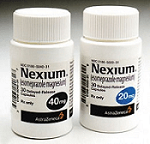 AstraZeneca ($AZN) and Ranbaxy Laboratories have been unable to wiggle out of a pay-for-delay case that said they colluded to keep generics of AstraZeneca's blockbuster heartburn medicine off the market until its patent expired in May 2014. The drug is still not on the market but at this point it is not because of backroom deals but because of FDA oversight and Ranbaxy's drug testing mess ups.
AstraZeneca ($AZN) and Ranbaxy Laboratories have been unable to wiggle out of a pay-for-delay case that said they colluded to keep generics of AstraZeneca's blockbuster heartburn medicine off the market until its patent expired in May 2014. The drug is still not on the market but at this point it is not because of backroom deals but because of FDA oversight and Ranbaxy's drug testing mess ups.
U.S. District Judge William Young in Boston said no to the drugmakers' request to derail the litigation by finding that the plaintiffs were unable to show that AstraZeneca compensated Ranbaxy to hold off its copy, Bloomberg reports. According to the National Law Journal, the plaintiffs are relying on witnesses to give evidence that AstraZeneca made deals worth about $700 million with Ranbaxy if it would hold off on producing its generic after indicating in 2008 it was seeking approval for one.
The case is being watched closely by the industry since it is at the forefront of litigation after a U.S. Supreme Court ruling last year that reversed a circuit court ruling that shielded the companies from most lawsuits challenging their patent deals. The industry has for years argued that the settlements reached with generic drugmakers to set aside challenges to their patents actually speed generics to market rather than impeding competition. While the court did not agree with the FTC that the deals are inherently anticompetitive, it did say the agency and others can try to prove that specific cases are. The FTC has indicated it will continue to pursue these cases doggedly and was hoping to extract a $1 billion settlement in one this year.
Nexium is a big seller, bringing in $2.8 billion so far this year for AstraZeneca. The fact that Ranbaxy has yet to come to market with a generic has allowed AstraZeneca to raise its forecast for the year. Ranbaxy has the first-to-file exclusive right to make generic Nexium but at this point is is not any patent litigation deals that is at play. Instead, the FDA has banned the drugmaker from shipping product from the Indian plants where it was slated to make generic Nexium. The FDA has cited them for faking drug testing data which raised the possibility that the drugs made there did not meet required specs.
There has been an effort to force the FDA to allow other generic drugmakers to bring their own generic Nexium to market and provide pricing relief for consumers and payers. The FDA recently withdrew Ranbaxy's tentative approvals to make Nexium and Roche's ($RHHBY) Valcyte and then gave two other drugmakers permission to make Valcyte. But the FDA has not done the same for Nexium and has refused to give any insight into what its plans are for that drug.
- read the Bloomberg story
- get more from the National Law Journal